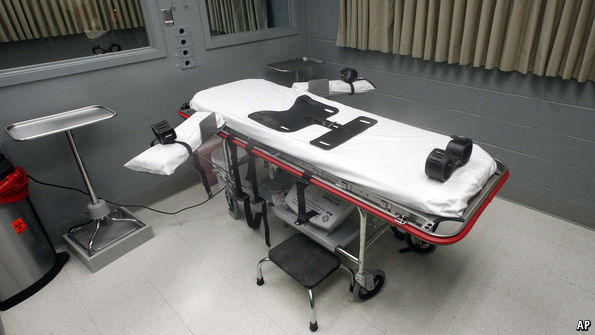-
Tips for becoming a good boxer - November 6, 2020
-
7 expert tips for making your hens night a memorable one - November 6, 2020
-
5 reasons to host your Christmas party on a cruise boat - November 6, 2020
-
What to do when you’re charged with a crime - November 6, 2020
-
Should you get one or multiple dogs? Here’s all you need to know - November 3, 2020
-
A Guide: How to Build Your Very Own Magic Mirror - February 14, 2019
-
Our Top Inspirational Baseball Stars - November 24, 2018
-
Five Tech Tools That Will Help You Turn Your Blog into a Business - November 24, 2018
-
How to Indulge on Vacation without Expanding Your Waist - November 9, 2018
-
5 Strategies for Businesses to Appeal to Today’s Increasingly Mobile-Crazed Customers - November 9, 2018
Pfizer bans use of its drugs in executions…
Pharmaceutical giant Pfizer is taking additional steps to block the use of its drugs in the capital punishment process.
Advertisement
“We are enforcing a distribution restriction for specific products that have been part of, or considered by some states for, their lethal injection protocols”, the New York-based drugmaker said on its website.
As a result of Pfizer’s action, there isn’t a single company that makes execution drugs with Food and Drug Administration approval that allows the drugs to be used in lethal injections, according to Maya Foa, who tracks drug companies for the advocacy group Reprieve.
The list of products includes the powerful anesthetic propofol, the drug that caused the death of pop superstar Michael Jackson.
It restricts a select group of wholesalers, distributors, and direct purchasers from reselling the products to correctional institutions for use in lethal injections. “It’s offensive to the medical mission of the pharmaceutical companies when states misuse these medications, which are created to save lives and improve the quality of lives by instead using them to kill prisoners”, he said.
Government purchasers must certify that the products will only be used for “medically prescribed patient care”, the company said. Utah voted a year ago to reinstate the firing squad, while Tennessee expanded its use of the electric chair in 2014, in case “lethal injection is deemed unconstitutional or if the execution drugs can’t be obtained”.
Some remaining death penalty states have been using compounded versions of drugs that fall outside of FDA approval. Last year, there were 28 in six states. In 2000, 41% of people living in Houston, Texas-home to hundreds of executions over the last thirty years-said they prefered the death penalty to life imprisonment for first-degree murder.
Kiefer says that with those drugs it usually took about five to 10 minutes for an inmate to die.
” ‘Suddenly he opened his mouth, ‘ Kiefer says”.
Despite attempts from the executioner to reassure the distressed crowd that everything was OK, Wood continued to struggle.
The US Supreme Court issued in June 2015 a landmark decision declaring death by lethal injection legal. Since then, the number has steadily fallen, reflecting increased scepticism about the ethics of the death penalty, fewer states where the punishment remains valid and less willingness by state officials to implement it. Supporters are dwindling even in places where capital punishment is avidly imposed.
“But others, noting the evidence that states are making covert drug purchases, see a different motive”.
Advertisement
The move comes at a time when the death penalty seems to be spiraling ever downward to its own demise. Others rely on compounding pharmacies, outlets subject to laxer regulation and oversight.





























